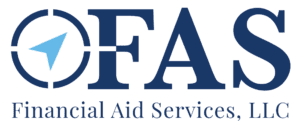Oh no, not I, I will Survive.
By: Sharon Hassan, FAS Consultant
Recently a friend treated me to see Diana Ross in concert. It was a much-needed outing. One of many songs she sang was the 1978 Gloria Gaynor hit, ‘I Will Survive’. One may ask how does this relate to financial aid? Where am I going with this? So glad you asked.
In the Challenges Deserve Solutions: Rethinking the Financial Aid Services Model article Robert Heil, CEO of FAS candidly addressed the enrollment cliff. “College enrollment is dropping, headed for a widely foretold ‘enrollment cliff’ due to a wide array of economic factors that will take a broad set of collective actions to address.” The root causes of this downward trend can be attributed to a diverse range of economic factors, which demand a united and comprehensive approach to finding effective solutions.
As consultants, we often work with clients who have already experienced the “enrollment cliff.” Enrollment is down. Area colleges and universities are attracting the students you used to get. Revenue is down. Expenses continue to increase. Post-COVID staffing is a challenge. Even the old faithful question the purpose of coming into an office every day. If we are completely honest, coming into an office every day was already an issue especially for millennials and other groups years before the pandemic.
The decline in college-aged students was predicted over 20 years ago. Yet, as colleges experienced the scenarios listed above, many said, “Oh no, not I, I will survive.” Even after hundreds of colleges closed before the pandemic, some continued to say, “Oh no, not I, I will survive.” So, what can you do? Is it too late?
Sadly, for some schools it is. However, for most there are opportunities to make changes now, that will positively affect your trajectory and set you on a path to success– however, that is defined for you. Essential to-do’s that can make a significant difference:
Make time to honestly assess where you are.
Allocate time to assess your current position objectively. Identifying strengths and weaknesses is crucial for charting a path forward.
Don’t wait until you are in trouble to seek help.
Hiring experienced consultants can provide invaluable guidance and support. Whether it’s training, interim staffing, or establishing efficient remote processing, expert assistance can be a game-changer.
Consider hiring FAS consultants to help.
-
- Training
- Interim Staffing
- Processing-remote
Pay attention to the data.
Pay close attention to data analytics. They offer essential insights into trends, challenges, and areas of improvement, empowering you to make informed decisions.
Acknowledge and address competition.
Competition is a real factor in today’s educational landscape, presenting itself in various forms. Acknowledge this reality and develop strategies to stand out and remain relevant.
Never think you are immune to challenges.
Never assume your institution is immune to challenges. Staying humble and proactive will help you adapt and respond effectively to unforeseen obstacles.
Make thriving your goal instead of just surviving.
Shift your mindset from merely surviving to thriving. Aim to create an environment where your school not only meets expectations but surpasses them, delighting your alumni, students, faculty, and staff.
Your alumni, students, faculty, and staff expect you to thrive.
What’s Next?
Our team believes that challenges deserve solutions. We know how many challenges affect financial aid departments at higher education institutions. The good news? These challenges have solutions; new solutions, real solutions, and game-changing solutions. They come from empowering your existing team and optimizing your practices, and they create a better student experience—leading to satisfied students and better student outcomes.
Throughout the survey, campus leaders identified several recurring themes that form the framework for a better model for financial aid operations. We look forward to sharing those findings in our upcoming eBook this spring.
For a more detailed account of what FAS can do for your institution, reach out here to start a conversation, and watch out for our eBook for more information.



